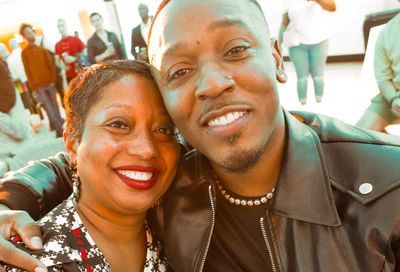Freedom Writer: Jon Robin Baitz
Playwright Jon Robin Baitz is using his skills to fight Trump the only way he can -- with deep, biting, close to the bone satire.

Jon Robin Baitz wasn’t surprised by the results of the 2016 presidential election, but he still was horrified by the victory of a candidate he equates to a con man in his political satire Vicuña & The American Epilogue.
The outspoken gay playwright behind the Broadway hit Other Desert Cities, a finalist for the 2012 Pulitzer Prize for Drama, and The Substance of Fire, Baitz couldn’t help but respond to a campaign he considered hostile towards immigrants, women, and LGBTQ citizens. Born in Los Angeles and raised in Brazil and South Africa, the L.A. resident says, “I felt a responsibility to bring perspective — an outsider’s insider perspective — to the problem of writing about this, so that I can say at least my theater wasn’t a passive one.”
His artistic call to action produced Vicuña, a searing theatrical takedown of a morally threadbare Republican presidential candidate. Concerning a Trump stand-in named Kurt Seaman, his Iranian immigrant tailor Anselm, and Seaman’s devoted daughter Srilanka, the comedy premiered at Center Theater Group in Los Angeles just before the election, and afforded the artist some measure of solace. “‘What did you do during the war, dad?’ I wrote some plays that tried to incrementally address what it was like to live through that time.”
Not only did Baitz write, he marched. In January, he joined his friends amid thousands of protesters at the Women’s March in January. And it was while in D.C. that Baitz learned the true nature of some of those who had helped put the new President into office, finding himself embroiled in a physical altercation with Trump supporters. The melee left Baitz shaken, incensed, and inspired to re-address Vicuña, to which he added a devastating new coda, The American Epilogue, which is having its World Premiere at Mosaic, one of D.C.’s most thrilling and vital new theater companies.
“I projected the feelings I had that night, lying on the curb in Dupont Circle with blood pouring down my head,” he says. “I projected them into their worst-case scenario, where those forces that were unleashed continued unabated.”
A blistering “glimpse into the soul of a man,” to borrow a phrase from the play, the just-completed Vicuña & The American Epilogue speaks for itself with Mosaic Theater Company’s powerful new production. Baitz, meanwhile, remains sheepish about discussing details of the painful Women’s March incident, and not just because the criminal case against his alleged attacker has yet to be litigated.
Instead, the gregarious stage, film, and TV storyteller, who created and produced ABC’s beloved series Brothers and Sisters and has been tapped to write the next installment of Ryan Murphy’s new series, Feud, has found himself using art as a means of coping with the craziness of the current administration.
METRO WEEKLY: Did you stress over this production of Vicuña as if it were a new play, or did it feel more like a refinement?
JON ROBIN BAITZ: You know, this is an odd play and sort of requires that it be new at least now. It’s only the second production of it, so I was still working on the text a lot, and of course part of the text is brand new. I’m not really going to notice when the play’s being done, hopefully, by colleges or places around the country that I’m not aware of, but since I’m here, it can be a kind of excruciating agony to get it right. I pride myself on being cool and relatively sanguine, but it’s difficult at times. So it is a new production in many ways. The L.A. production was sort of a test balloon.
MW: How much do you keep an eye on what other people are doing with your shows?
BAITZ: I always used to tease Edward Albee for that. He would get faxes at home of every cast everywhere. Like it was the CIA. I really think you have to let them go, because if you don’t let them go, you’re not going to be able to do the new ones.
MW: Is Vicuña something you couldn’t let go?
BAITZ: No, I haven’t let go of the play. Since I started writing it, it’s been a thorn in my side, because of the delicate balance trying to get tone and a suspension of disbelief right. Forget about the technical stuff. The problems the play looks at are just worse and worse and worse now.
For me, the existential question is, is it measuring up to the horror of our time? What is the angle of the laughter to the event itself? Where are we coming at the laughter from? Are we weary? Are we exhausted and depleted? Are we outraged still? We need to be more outraged still. How do I do that? I’ve always been labeled as a political playwright, but I’ve always thought of myself as a lazy moralist. And this play in particular calls for people to ask themselves the questions in the epilogue which is: what are we going to do now? What’s next? What are we bringing to it? Otherwise, we’re ghosts.
MW: When did you start writing the play?
BAITZ: During the primaries. I remember being on an airplane and just sitting there, horrified, and thinking the playwrights I have always really related to most have been British political playwrights that came of age and thrived in the ’60s and ’70s — David Hare, Howard Brenton, and obviously Pinter earlier than that. Caryl Churchill. Even Wally Shawn, who is an English playwright in his own way.
So I’m sitting, watching this kind of panoply of stupidity and evil on television on a plane flying west to work on a television thing, and I thought, “What kind of playwright are you if you can’t actually live in this moment and fight this moment?” The way some of the playwrights I mentioned looked at Thatcherism, which was a great evil of their time, and which was, in some ways, responsible for some of their best work.
Yesterday, there was a talkback after the performance and someone said, “There’s so much despair.” I said, “Yeah, but the question is, what now?” And this lady said, “Well, what now?” I said, “Numbers. It’s all about numbers.” It’s building on the numbers of an emboldened populace that isn’t benumbed and becalmed. That scares them. They need to start being very much afraid of the moral consequences that we do live with still, despite their vast, almost unimaginable reserves of cynicism. They exist in the same moral universe that we do.
MW: The play references the chant “You will not replace us.” Do you feel that Charlottesville was a turning point, at least in the question of morality?
BAITZ: There are so many turning points, it’s almost circular. I think that was a turning point. For me, I had a kind of epiphany on the night of the Women’s March here in D.C., when I got into an unfortunate altercation that ended up with me having a broken wrist and a broken elbow and stitches in my forehead.
If you remember, the night before, D.C. was filled with celebrants mingling mostly peacefully, but some were intoxicated with the scent of permission that they’d been given to be their worst selves. And I had a run-in with — I can’t be specific, because there’s actually a trial with someone who picked me up and threw me. I realized that night that the wink and nod coming from our president, and the dog whistle, was very loud and very evident and easily seen if you had the right glasses on. That led me to writing the epilogue.
MW: The epilogue is despairing.
BAITZ: Yes.

MW: Is that still your point of view, after 10 months of the Trump administration?
BAITZ: As long as you walk away with this question of what do you bring to the fight, of where do you stand. There’s a particular kind of class apathy that’s easily available to a lot of people. And I’ve seen it before. I spent eight very, very formative years in South Africa during apartheid as an American kid, but I was so amazed by how comfortable people who appeared to have a sense of man and God and their place in the world were with the evil of apartheid, and how one could benefit from it while tacitly disapproving of it and how that disapproval meant nothing at all unless there were actions. So many people did take action. But now I see the same kind of upper middle class complacency that for me was evident in my particular circle, which was the wealthy Jewish population of Durban, South Africa in the ’70s. I went to a Jewish day school, and there would be so many films about Nazi Germany shown to us kids, in the midst of apartheid, and no connections being drawn — except, of course, by me, the asshole at 15, 16. But that’s never subsided for me. Now I see the culture of distraction here substituting for the culture of apathy and indifference.
MW: Vicuña seems more critical of Seaman’s enablers than of him, but that also assumes that the enablers — the Srilanka’s, or Ivanka’s or Jared’s of the world — have a conscience that we hope they have.
BAITZ: We can’t assume it. I think that there’s a psychopathology in the case, for instance, of Jared. This is a weird corollary, but stick with me. The children of suicides feel empowered, and the impossible becomes possible for many of the children of suicides. In many ways — and I don’t know the statistics — you’re more likely to commit suicide because it has been made possible by your parent. If you have a felon as a father, a criminal who’s clearly suffering from a profound lapse, at best, but whose moral culpability is enormous, if that’s your father, I think it could possibly create an opening in you for justifying anything.
Of course, not all criminals are born of criminals, but this particular mendacity, this white collar savagery, as I think of it, is extraordinary to me. The great national autism is simply a moral one. We have to start looking at the disease of not having empathy in a culture and how that can be inculcated. In the case of Srilanka in the play, I give her a conscience, but I damn her doubly more.
MW: For not acting on it?
BAITZ: Yes, she’s the most complicit. She’s the most deadly of the enablers. And I give her a suitable ending. I don’t like these people one bit. They’re not good people.
MW: What about the bad guys on the other side? Are they not as bad?
BAITZ: No.
MW: Is there only one side?
BAITZ: No, there’s only love or its absence. If you live in love, if you live in grace, if you live in goodness, if you live in giving of yourself, giving greedily, which I think is the way Sigmund Freud described Christ somewhere. He gave greedily. I’m not saying I’m a religious man, but I do believe that sacrifice is one of the only ways to purify yourself. Whether it’s through work and time, but goodness is everything. So when I see all the forms of cynical corruption on supposedly the Left, it’s actually worse. It’s much worse for me. Who are people supposed to believe in? Who are our children, who are young people supposed to believe in?
MW: You teach young artists. Whom do they believe in? What’s inspiring them now?
BAITZ: We’re in a strange moment now, where young artists are kind of torquing their bodies out of an impersonal culture, and they’re twisting their way out of a web in which they’re trapped like it’s a death caul. So it’s a transition time. To be a young white, cisgendered, heteronormative artist requires the most agonizing questions that you ask of yourself. I see different kinds of students with different kinds of voices having to grapple with different moments that they’re all in culturally.
I know that there’s also a mob as well. You see the mob in colleges. I read that Michael Weller’s play Buyer Beware was shut down at Brandeis this week. A play about Lenny Bruce and his use of the N word, but set now on the college campus at Brandeis. And someone who hadn’t even read the play demanded that it be pulled. She wasn’t even there, she was on the West Coast, but she knew enough about it from descriptions to demand that it be canceled. And it was canceled.
We’ve got to find ways, and hopefully it’s in the theater first, of coming together like it’s church, really coming together and being able to fearlessly talk to one another, ask questions that make us miserable, that make us face what we have done and what we are.
MW: If that were to include supporters of Trump, what does this show have to say to them?
BAITZ: Someone asked me that last night, and I said I’ve said everything already. I’ve said that you made this possible. I no longer have the luxury of trying to understand them. That is a liberal conceit. Now I just want to fight them. I don’t actually feel compelled anymore to offer them the kind of humanizing discourse that they refused everybody else.
MW: An early turning point for me — and for a lot of people — was Trump mocking the reporter.
BAITZ: Totally.
MW: That anyone would need to have it explained to them, that he was mocking someone’s disability. That’s what I can’t deal with.
BAITZ: Yeah. It was hard enough to fucking deal with the Clintons’ kleptocracies. It was hard enough to deal with the strange sense of establishment rot that exuded from them. I could never excuse it. It’s why every young person in the world turned away from them frankly. And it’s actually why I thought that Donald Trump was going to be the next president.

MW: Do you feel at all encouraged by the indictments coming down? I heard a phrase the other day, “the end of the Trump era,” but is there such a thing and will it end well?
BAITZ: This is an extraordinary country in a weird way. It’s extraordinary. We do everything wrong. We lie about the wars we get into. We get into wars based on lies. We create a religion based on selling shit. We abandon education as a holy responsibility. But there’s this strange little corner of the justice system that remains uninfected. I really do believe that. It’s very small, but it’s somehow there.
There are these rare glimpses of things. Edith Windsor, for example. I feel like the resistance will be in part in court, and in part in the voices of people, and probably also very much on the West Coast. I think there’s a kind of government in exile there who are resisting and leading the resistance — a legislative resistance, a judicial resistance — and offer sanctuary, too.
MW: Do you vote in New York or California?
BAITZ: Now, California, because I think it’s useful.
MW: Is that based on ideology?
BAITZ: No. I’m native Californian and it was a great moment to go back there with my husband. We were very worried, as he’s the, I guess you would call it, baby daddy to a trans gay couple. He has two kids with them. They’re in New York. We were sort of wishing they would live in California, because their lives will be easier there in some ways, though New York is pretty great.
MW: There are certainly worse places for them.
BAITZ: Yeah. My husband works for SAGE, which is Services and Advocacy for Gay Elders, so he brings this stuff home every day. The outrages, the ways in which the protections are being challenged. So, being in California has been helpful.
MW: It felt like a bastion for the resistance?
BAITZ: It does feel that way to me. A place to gather and strengthen.
MW: Is any of that undermined by what’s currently going on in Hollywood, in light of ongoing sexual assault and harassment scandals? It doesn’t help opinions of Hollywood liberals.
BAITZ: It doesn’t. This is very much like Freud’s suppression of the seduction theory. He had sort of realized that the child abuse in Austria during his time was epic. It was something that scared him to deal with. In a way, it was a kind of failure for him, because everybody he saw as a patient had a story of child abuse.
The epidemic now is of male monstrousness. We’re seeing it in the first places where it would come out, but it’s going to keep happening. Hollywood liberalism actually has been the cover for a long time. The ability to look away has been sickening for a long time. When I think about rumors about gay men in Hollywood — all the collective rumors — and how we have glanced in the other direction for so long, I’m struck by how easy it is to fail at being a good person every day. I’ve always actually been on the fringes of show business, more of a playwright, so I go and dip in, then come out, but you do feel it. You do feel this festering ugliness. In my case, I’ve always just ran the other way, not thinking about who was there, who was left there defenselessly.
But the resistance doesn’t really have to do with those people on the west side of L.A. or in the hills of Berkeley. It has to do with young people, the children of immigrants, immigrants themselves, it has to do with trans, gay, people of color. That’s who leads this moment. I will take my cue. I will take my direction thusly. Because Liberalism has failed completely. I grew up in a liberal household, and I know how little it means. It’s simply really expensive makeup from Saks Fifth Avenue, to put on your face so that you look nice when you look in the mirror. It is not a real functioning philosophy.
MW: Is that why the voice of conservatism in the play, a fictional Senator, is actually a good guy? She represents somebody who is at least thoughtful.
BAITZ: Yeah, but she didn’t do it the right way. She offered a bribe, which is funny, comic. It’s meant to be funny, and it’s meant to be awful. The play tries to thread the needle between that which is funny and that which is tragic.
MW: Speaking of tragic, you’re working on the next season of FX’s Feud, about Charles and Diana.
BAITZ: I am. Ryan Murphy has blessed me with taking charge of its next iteration. Me and my friend, Ned Martel, who’s an ex-journalist and critic from D.C. — the Washington Post, New York Times — who transitioned into becoming a TV writer.
MW: To create a fair fight, do you need to tarnish Diana’s halo, or is there a powerful feud that we just don’t know about?
BAITZ: I think it’s probably best to get rid of all the halos and to look at it as conceptual art. That there is this institution, which is based on artifice and a dream and a bloodline. It depends upon a kind of theater in order to maintain itself. They selected a woman who, on the face of it, represented all of those values. She even came from their class. The great story of Diana — it’s sort of the only story that there is for me — is someone waking up, someone awakening. She’s most certainly not an angel. She is capable of shallowness and of scheming. She’s tricky and modern, but unlike many of the Windsors, she has an uncanny empathy for the sorrows and tribulations around her of other people, people who are less fortunate. It’s a saving thing in her case. She was the first person in that entire ridiculous cadre of people to walk into an AIDS ward and to touch a patient’s hand. They’d never done it before. They were all afraid. She made it normal to actually touch the ill, and it changed the perspective in England at that time, really changed it. She’s a child when she gets the thing she wants/doesn’t want.
I think about it as Rosemary’s Baby a lot. To wake up and to realize that this beautiful fantasy that came true is in fact an endless nightmare where you’re the only one not in on the lie. And there was a lie from the very beginning. The lie was that Charles truly, deeply loved her. He did love her in his own strange, bewildered, stunted way, but not enough to make a life with her. I think she was radicalized by that.
MW: Maybe that will happen to Melania too?
BAITZ: Maybe it will. I wouldn’t count on it. I also see it as a war of sex and of PR, and the story of a kind of bankrupt institution, and a very cynical one at that, being forced to change. So yes, there is a lot of tarnish on the halo. You could look at it as the story of a catastrophic first marriage.
MW: If you were going to write a Feud of Trump versus someone, whom would it be?
BAITZ: I’d suppose it would eventually be the justice system. So, it would more likely be American Crime Story, because, of course, I think there will be criminal charges and hopefully [prison] time, which will be a very redemptive moment in American history.
Vicuña & The American Epilogue runs until December 3 at Atlas Performing Arts Center, 1333 H St. NE. Tickets are $20 to $65. Call 202-399-7993, ext. 2 or visit MosaicTheater.org.
Support Metro Weekly’s Journalism
These are challenging times for news organizations. And yet it’s crucial we stay active and provide vital resources and information to both our local readers and the world. So won’t you please take a moment and consider supporting Metro Weekly with a membership? For as little as $5 a month, you can help ensure Metro Weekly magazine and MetroWeekly.com remain free, viable resources as we provide the best, most diverse, culturally-resonant LGBTQ coverage in both the D.C. region and around the world. Memberships come with exclusive perks and discounts, your own personal digital delivery of each week’s magazine (and an archive), access to our Member's Lounge when it launches this fall, and exclusive members-only items like Metro Weekly Membership Mugs and Tote Bags! Check out all our membership levels here and please join us today!


























You must be logged in to post a comment.